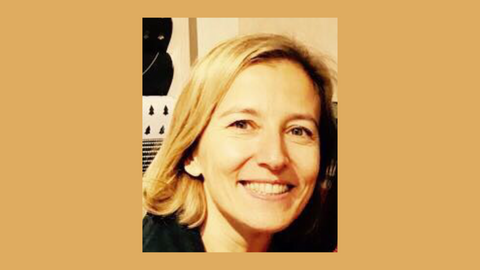
Our series continues where we ask leading specialists about themselves and their field. Today we're in conversation with Sonia Massai, Professor of Shakespeare Studies at King's College London, UK.
Sonia is the author of numerous books and essays on Shakespeare as well as being Principal Investigator on ‘Wartime Shakespeare’, a Leverhulme-funded research project, whose outcomes will include an exhibition at the National Army Museum in London in 2023-4 and accompanying exhibition book. She is currently preparing a new Shakespeare Arden edition of Richard III, and has been appointed as one of the General Editors of the New Cambridge Shakespeare (CSE) series.
===========================================
When and how did your love of Shakespeare start?
My love for Shakespeare started while I was still living in Italy. I was studying towards my first degree in Modern Languages when I met the English literature professor, William Nigel Dodd, who first introduced me to Shakespeare. He took me and other students to watch a production of Twelfth Night in a little market town theatre just outside Siena. This was the first time that I heard Shakespeare performed in English. It was a genuine revelation, an epiphany even... which is funny, given that the twelfth night after Christmas, the 6th of January, is more traditionally known as the Feast of the Epiphany.
The cult of Shakespeare, or Bardolatry, did indeed take on Biblical proportions when Shakespeare started to be venerated as England’s national poet. Most famously, David Garrick organized a three-day festival in Shakespeare’s hometown, the Jubilee of 1769, which first put Stratford-upon-Avon on the map as the destination of secular pilgrimages.
My Shakespeare has always been much more personal, though. My fondest memories go back to that fateful day when I felt moved by the unexpected reunion of identical twins Viola and Sebastian – they each thought the other had perished in the shipwreck that opens the play. Their surprise is magnified by the wonder of the other characters as they first see them together: ‘How have you made division of yourself?’, wonders Antonio, looking at his friend Sebastian, and at Viola, who, disguised as Cesario, looks exactly like Sebastian. ‘An apple cleft in two is not more twin / Than these two creatures. Which is Sebastian?’ The emotional power of this ending is heightened by the flowing, musical quality of Shakespeare’s blank verse. Try and read these lines out loud… you’ll find that the sounds – ‘you’ and ‘yourself’, followed by ‘two’, ‘twin’, then again ‘two’ – reproduce the logical impossibility of being ‘you’ and ‘yourself’ and being ‘two’, ‘twin’ and not ‘one’.
In his famous dialogue, The Symposium, Plato explains his theory according to which we were initially created as perfectly round creatures, at once male and female, made up of two halves that fitted perfectly together. Our perfection made the gods jealous. We were separated and love originated as a quest, of one half for the long-lost other half. I was nineteen when I watched Viola and Sebastian, as ‘two in one’, as ‘two’, ‘twin’ and one’, mirroring the desires of those who love them, independently of class, age, or gender – Olivia loves Viola-as-Cesario, and so does Orsino. I was rapt, … and I still am, more than thirty years later!
Who is your favourite Shakespeare character?/Who is your Shakespeare heroine?
Isabella from Measure for Measure. When asked by a corrupt magistrate, Angelo, to sleep with him to save her brother from execution for getting his girlfriend pregnant outside wedlock – an insanely harsh punishment (or ‘measure’) even by early modern standards – she refuses. Her predecessors in Shakespeare’s sources give in to blackmail and to the argument that their brother’s life is worth more than their virginity. Shakespeare changed this important element of the original story to spare Isabella. For the first time in the transmission of the long-travelled story which inspired Measure for Measure the heroine stands up to the demand that she gives up her body. For the first time, she claims a woman’s right to consent to sexual intercourse. To this day, some critics condemn Isabella for being
selfish and cruel, which is shocking and telling of how far we still need to go to support the victims of sexual violence.
Tell us more about your upcoming exhibition at the National Army Museum and about wartime Shakespeare.
The ‘Shakespeare at War’ exhibition, which is due to open at the National Army Museum in London in October 2023, highlights a strong correlation between the history of the British Army and the history of how Shakespeare has been mobilized at times of war, both on and off the battlefield. Army officers often find in Shakespeare the inspiration for eve-of-battle speeches that they give to their soldiers, as they prepare to lead them into extremely dangerous and volatile war zones. But Shakespeare is also routinely quoted, performed, or adapted to raise morale or to critique the reasons for going to war, to rally support for the troops or to help those involved in conflict to process the experience of being at war.
My colleague, Dr Amy Lidster, and I have also co-edited Shakespeare at War, a companion book that gathers essays by scholars, theatre directors and historians who write about some of the archival objects that will be included in the exhibition. These objects tell interesting and diverse stories that nuance what we thought we knew about all major conflicts with a British involvement from the English Civil Wars in the mid-seventeenth century up to the Iraq War and the current conflict in Ukraine. The objects range from production photographs, playbills, posters, cartoons, letters and diaries, as well as military badges, emblems and memorabilia.
Best piece of advice ever given?
Reconnect with your ‘exiled self’. No matter how fortunate or unfortunate one’s starting point in life is, we all lose touch with parts of ourselves as we grow up. According to French philosopher Jacques Lacan, as we learn to speak, we repress anything that does not fit with whatever ‘I’ means in the unique context of our own cultural and historical moment. What does it mean to say ‘I am’ as an early twentieth-first century woman, born in a Western European country like the UK? It means something very different from being born at the same time in a different world region, or at a different time in the UK. What we feel is not appropriate, fitting, acceptable, desirable gets pushed out of our consciousness, as we identify with what psychologists describe as our ‘cognitive state’. In this respect, we all suffer from post-traumatic disorder. Far from wanting to underestimate the impact of personal or transgenerational trauma in individuals exposed to violence, loss, or dislocation – directly or indirectly – I have come to realise that the best lesson I can draw from reading great works of literature and sharing them with my students has to do with reconnecting with an emotional core that is raw and not a little bit scary. I am now fifty-three, and one of my goals is to reconnect with that part of me that doesn’t feel like me, that doesn’t come into focus as I function (or mostly struggle to function!) as a professional, full-time working mother of two gorgeous girls.
What has been your proudest moment?
My appointments to a full professorship at King’s College London and to the role of general co-editor of the Cambridge Shakespeare Editions with two wonderful colleagues of mine, Prof. Margaret Jane Kidnie (University of Western Ontario) and Dr Gillian Woods (Birkbeck College, University of London). It is highly unusual for non-native speakers of English to get to teach Shakespeare Studies in Russell Group universities in the UK. The editing of Shakespeare is even less diversified: editors of Shakespeare have traditionally been white, male and linked to prestigious educational institutions in the UK, US and Canada. MJ, Gill and I are the first all-female team of general editors of Shakespeare since the rise of the professional editorial tradition in the late nineteenth century. We believe we have proposed a radically innovative series to Cambridge University Press. Our commissioning editor, another formidable female colleague, Emily Hockley, has contributed to and supported our vision for a new type of critical edition that will encourage active learning. And we are actively commissioning scholars to edit the single-text volumes that will make up this new series of critical editions more diversely than earlier generations of general editors have done so far.
What do you never leave home without?
Oat cakes, especially when I travel to Continental Europe, where it is impossible to find them, even in delicatessens or specialist food stores. I do not have any food allergies or intolerances, but, as I get older, I find travelling more challenging. I get achy, crampy, and oh so tired, and I find that oats give me steady levels of energy and a pain-free stomach and tummy. I also have inordinate amounts of dark chocolate in my bag, backpack, and carry on luggage. You’ll never catch me without it.
What next?
It’s been a tough year. I lost my mum in the autumn. I had also underestimated what it would feel like to reach my early fifties, both physically and emotionally. I know that I would feel a lot better if I could spend more time by the sea. Perhaps like Viola I need a shipwreck, so I can get lost and find myself again.




Leave a comment